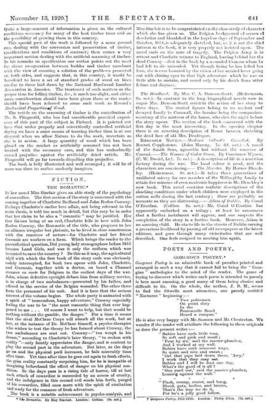POETS AND POETRY.
GORGEOUS POETRY..
Gorgeous Poetry is an admirable book of parodies printed and arranged in such a way that it cannot fail to bring the " Geor- gian " anthologies to the mind of the reader. The game of trying to discover which writer each poem is intended to parody is here most amusing, a good many of them being elusive and difficult to fix. On the whole, the author, J. B. M, seems to find the Sitwells most attractive, one parody entitled " Nocturne " beginning :- "Two policemen
On point duty In the
Pentonvillo Road Heard a rumpus."
He is also very happy with Mr. Sassoon and Mr. Chesterton. We
wonder if the reader will attribute the following to these originals as does the present writer :—
" Babies have such little toes,
So soft and pink and small ;
Four by six,' said the master-plumber,
Arid I worked at icy wall.
Babies have such innocent ways, So quiet and nice and sweet ; 'Get that pipe laid down there, 'Arry.'
I work that they may eat.
Babies and I will be dust one day,
What's the good of it all ? 'One yard out,' said the master-plumber, Leaning against the wall."
"Flash, ertunp, crater, and bang, Blood, guts, bodies, and brains, That's the way we do it,
For he's a jolly good fellow.
.! Gorgeous Poetry, 1911-192.0. London: Philip Allan. !P.a. net.] At home they smoke coronas, And applaud leering girls . . . And ogle twice a night . . . God ! If I had a four-point-five ! "
The Irish school, Mr. Waley's Translations from the Chinese, the disciples of Rabindranath Tagore, and Mr. Robert Graves are all equally successfully dealt with, but, in spite of the reac- tionary preface, J. B. M. feels just as strongly on the subject of what we might call the Classical Inadequate School. Witness the following :— " The blackbird's gay November song And the primrosos scattered far Fill all the sky with lutes and bells From star to frosty star.
Beside the pond the pipit cries, The heather's all abloom, The winter sun among the sedge Weaves and unweaves its loom."
There is still, bulk for bulk, three times as much of this kind of poetry written as of the more modern sort. We are glad that J. B. H. has included it in his reprobation.
It is encouraging to see that the new school of poetry is breed- ing a likely school of parody and satire. No Government can exist without an Opposition. Poets fall into absurdities unless they are criticized, and of all criticism the parody is perhaps the most effective and the least offensive. It is like the -parable in the world of ethics—it does not rouse a spirit of opposition in the individual criticized. The study it shows of the poet's work even turns it into a kind of wry compliment. We can accept its hints without loss of amour-propre. Many of us dislike being told that we are getting fat, but few of us are so ill-tempered that we should frown at the distorting glass that tells us so with disarming exaggeration.







































 Previous page
Previous page